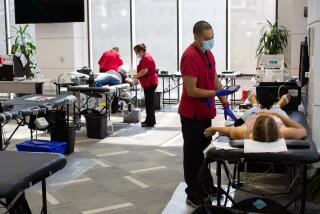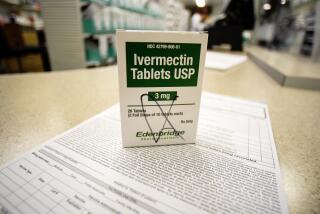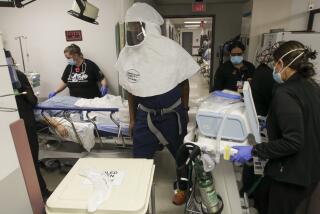Science/Medicine : AIDS and Doctors: Should There Be Restrictions? : Disease: The case of a dentist suspected of infecting a patient has left federal officials ensnared in an emotional debate over curbing the activities of health-care workers.
- Share via
The extraordinary case of a Florida dentist suspected of having spread the AIDS virus to a patient has left federal health officials ensnared in an emotional debate over whether to place new restrictions on the activities of infected doctors.
A top AIDS official at the U.S. Centers for Disease Control said last week that the agency had been unable to settle on even a preliminary draft of a new policy. Asked when one might be forthcoming, he said, “Don’t hold your breath.”
“The real heart of the issue is that there are opposing emotional and intellectual views,” said Dr. Harold Jaffe of the CDC. “I think emotionally, most of us would be reluctant to have surgery or dentistry done by an infected person.
“But intellectually, the people who have looked at the facts realize that whatever the risk might be, it’s really quite small,” he said. “I just don’t know how those views can be reconciled.
The issue, simmering during most of the decade-long AIDS epidemic, came suddenly to a boil in late July when the CDC reported that the dentist, Dr. David Acer, appeared to have inadvertently infected a woman, now age 22, during a tooth extraction.
Since then, the dentist has died of AIDS. Hundreds of his patients have been tested, turning up two more who are infected, though not clearly by Acer. The original patient, Kimberly Bergalis, has sued Acer’s estate and appeared on television saying infected health workers should be required to disclose their condition.
Meanwhile, CDC officials met in August with about 70 consultants to discuss whether to change the current policy. Under that policy, the duties of infected workers are determined “on an individual basis” in consultation with the worker’s physician and employer.
If the CDC were to change that policy, its alternatives range from suggesting screening of certain health-care workers for the human immunodeficiency virus (HIV) to recommending that infected dentists and surgeons not perform certain risky procedures.
“If you accept that as an option, you have to talk about how to identify infected dentists and surgeons,” said Jaffe of the CDC. That, in turn, could “intrude on issues of civil rights.”
“It’s a fascinating study in how policy gets formulated,” said Dr. Frank Rhame, one of the consultants to the CDC and an infectious-disease specialist at the University of Minnesota Hospital.
“You can have a large number of so-called experts up there--talking heads and their tortured logic--and you can have this very attractive person (the infected woman) up there . . . and I can guarantee you who will prevail in that struggle for the public mind.”
Earlier this month, amid rumors that new, more restrictive guidelines were imminent, the American Civil Liberties Union wrote to federal health officials raising concerns about whether the process being used to consider new guidelines was sufficiently public.
“It seemed odd that the single, exceptional case of the dentist appeared to be driving a complete revision of policy,” said William Rubenstein of the ACLU.
The American Medical Assn., too, expressed concerns to the CDC.
“Our posture was we didn’t believe that the first case was proven,” said Dr. Roy Schwarz, chairman of the AMA’s task force on AIDS. “We just said that you’ve got to have more and stronger science.”
Infection of patients by health-care workers can occur only during so-called invasive procedures in which body tissues are penetrated by a surgical instrument. For transmission to be possible, the infected surgeon or dentist’s body fluid must mix with the patient’s.
Even when that happens, the odds of infection appear to be extremely low. Studies examining the risk to health-care workers from infected patients estimate that only 0.4% of all needle-sticks involving contaminated blood have resulted in infection.






